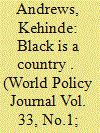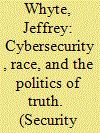|
|
|
Sort Order |
|
|
|
Items / Page
|
|
|
|
|
|
|
| Srl | Item |
| 1 |
ID:
144408


|
|
|
|
|
| Summary/Abstract |
Racism transcends borders and so too must the fight against it, argues Kehinde Andrews. Too often, analyses of race are hemmed in by “methodological nationalism,” or the tendency to frame our thinking around the nation-state. Instead, Andrews says, the African diaspora should unite across oceans and boundaries to form a country based on freedom and equality for Black populations.
|
|
|
|
|
|
|
|
|
|
|
|
|
|
|
|
| 2 |
ID:
159492


|
|
|
|
|
| Summary/Abstract |
Since 2013, protests opposing police violence against Black people have occurred across a number of American cities under the banner of “Black Lives Matter.” We develop a new dataset of Black Lives Matter protests that took place in 2014–2015 and explore the contexts in which they emerged. We find that Black Lives Matter protests are more likely to occur in localities where more Black people have previously been killed by police. We discuss the implications of our findings in light of the literature on the development of social movements and recent scholarship on the carceral state’s impact on political engagement.
|
|
|
|
|
|
|
|
|
|
|
|
|
|
|
|
| 3 |
ID:
187117


|
|
|
|
|
| Summary/Abstract |
This article explores the racial politics underwriting cybersecurity’s recent human turn toward the issues of online disinformation and ‘foreign influence’ in US politics. Through a case study of the Black Lives Matter (BLM) movement, this article’s first half considers how contemporary cybersecurity has produced ‘racial division’ as an object of security by framing the BLM movement as a geopolitical vulnerability open to foreign manipulation through social media. In its emphasis on the political protest as a site of insecurity, I argue that contemporary cybersecurity has widened its traditional spatiality ‘beyond the computer’. In the article’s second half, I argue that the racialization of cybersecurity has underwritten a politics of truth ultimately concerned less with parsing true from false, and more with defining the boundaries of secure political knowledge and communication. I argue that contemporary cybersecurity has produced an idealized subject for whom an obligation to possess contingent forms of knowledge becomes a condition of secure political subjectivity. I conclude with a critique of contemporary cybersecurity’s tendency to portray dissident political movements like BLM as ignorant or disinformed.
|
|
|
|
|
|
|
|
|
|
|
|
|
|
|
|
| 4 |
ID:
185068


|
|
|
|
|
| Summary/Abstract |
This introduction to the special issue ”Global Counterinsurgency and the Police-Military Continuum” examines the emergence of global counterinsurgency in the twentieth century and introduces the critical concept of the police-military continuum. Through a review of the recent literature, it also provides a framework for analyzing the relationship of historical trends and contemporary developments in what is typically labeled ”police militarization.” It introduces and summarizes the fourteen original research articles in the special issue, which analyze United States, United Kingdom, Costa Rica, Haiti, India, Kenya, Malaysia, Tanganyika, and elsewhere. The introduction explains the genesis of the special issue in the aftermath of the rebellions of 2020, and it also considers new directions for research in the aftermath of the events of 6 January 2021 at the US Capitol, as well as what these events indicate about counterinsurgency’s possible future mutations.
|
|
|
|
|
|
|
|
|
|
|
|
|
|
|
|
| 5 |
ID:
144411


|
|
|
|
|
| Summary/Abstract |
The protests that have emerged in the United States under the banner Black Lives Matter are similar to decades-old movements in Latin America. At the core of all of this organizing, according to Tianna S. Paschel, is the same attempt to humanize black people. While those interested in inequality have tended to ask how black people are living, black rights movements across the Americas are demanding that society confront a more difficult question: How are black people dying?
|
|
|
|
|
|
|
|
|
|
|
|
|
|
|
|
| 6 |
ID:
144412


|
|
|
|
|
| Summary/Abstract |
Janaya Khan, the Canadian co-founder of Black Lives Matter–Toronto, and Daniela Gomes, a São Paulo-based journalist and scholar, are part of the same fight to end anti-black racism. They’re just doing it some 5,000 miles apart in different countries and languages. But in their conversation with each other, it becomes clear that they face many of the same challenges in overcoming their countries’ naïve narratives on race.
|
|
|
|
|
|
|
|
|
|
|
|
|
|
|
|
| 7 |
ID:
175271


|
|
|
|
|
| Summary/Abstract |
The Black Lives Matter (BLM) movement has organized hundreds of disruptive protests in American cities since 2013 (Garza 2014; Harris 2015; Taylor 2016). The movement has garnered considerable attention from the U.S. media and is well recognized by the U.S. public (Horowitz and Livingston 2016; Neal 2017). Social movement scholars suggest that such robust mobilizations are typically predicated on clear social movement frames (Benford and Snow 2000; Snow et al. 1986). Tillery (2019b) has identified several distinct message frames within the social media communications of BLM activists. In this paper, we use a survey experiment to test the effect of three of these frames—Black Nationalist, Feminist, and LGBTQ+ Rights—on the mobilization of African Americans. We find that exposure to these frames generates differential effects on respondents’ willingness to support, trust, canvass, and write representatives about the Black Lives Matter movement. These findings raise new questions about the deployment of intersectional messaging strategies within movements for racial justice.
|
|
|
|
|
|
|
|
|
|
|
|
|
|
|
|
|
|
|
|
|